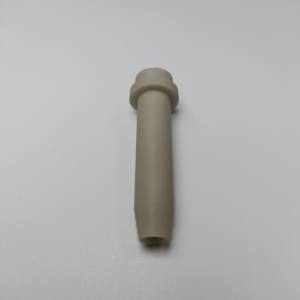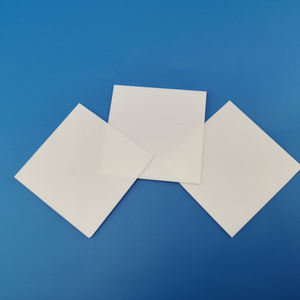Discover Premium Ceramic Products | Durability & Elegance United | Advanced Ceramics
PRODUCT PARAMETERS
Description
Overview of aluminum nitride ceramics
Aluminum Nitride Ceramic is an advanced ceramic material with aluminum nitride as the main component. It has been widely used in electronics, optics, and mechanics due to its unique properties.
Features of aluminum nitride ceramics
High thermal conductivity: Aluminum nitride ceramics have relatively high thermal conductivity, usually between 170-260 W/m·K, which makes it an excellent heat dissipation material. It is especially suitable for electronic devices that require efficient heat dissipation, such as substrate materials for power semiconductor devices.
Good electrical insulation: Despite its high thermal conductivity, aluminum nitride ceramics are excellent insulators of electricity, which can effectively prevent current leakage and ensure the safe operation of electronic components.
Low dielectric constant and dielectric loss: These characteristics make aluminum nitride ceramics very suitable for use in high-frequency circuits because it can reduce energy loss during signal transmission.
High temperature resistance: Aluminum nitride ceramics can maintain structural stability and strength at extremely high temperatures. Its melting point is about 2800°C, so it is suitable for applications in high temperature environments.
Low thermal expansion coefficient: Compared with semiconductor materials such as silicon, aluminum nitride has a lower thermal expansion coefficient, which means it has better dimensional stability when the temperature changes, which helps improve packaging reliability.
Corrosion resistance: Aluminum nitride ceramics have good chemical stability to most molten metals and are not easily oxidized or corroded, allowing them to perform well in harsh environments.
High mechanical strength: Although not as hard as some other types of ceramic materials, aluminum nitride ceramics still provide enough mechanical strength to allow them to be used in many structural applications.
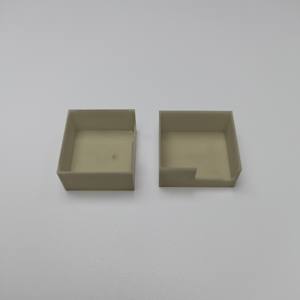
(Ultra-thin AlN Ceramic Substrate / 0.1mm Thickness Aluminum Nitride Ceramic)
Specifications of Ultra-thin AlN Ceramic Substrate / 0.1mm Thickness Aluminum Nitride Ceramic
The Ultra-thin AlN Ceramic Substratum includes a thickness of 0.1 mm, developed for high-performance electronic devices requiring precision thermal administration. Aluminum nitride (AlN) acts as the base product, recognized for exceptional thermal conductivity. This substratum efficiently transfers warm, perfect for gadgets needing rapid air conditioning. Its thermal conductivity reaches 170-180 W/m · K, outperforming numerous typical ceramics. The slim profile enables integration into portable layouts without compromising efficiency.
Electric insulation is a crucial advantage. The product stands up to high voltages, lowering dangers of short circuits. It operates accurately in temperatures from -50 ° C to 350 ° C, ideal for extreme environments. The reduced thermal growth coefficient matches materials like silicon, lessening stress during temperature level modifications. This compatibility ensures secure efficiency in semiconductor and power electronic devices applications.
Surface area smoothness improves capability. The substrate’s great surface sustains specific circuit printing, important for microelectronics. Mechanical strength stays high in spite of the thin framework, standing up to fractures during handling. Chemical resistance includes sturdiness, shielding against acids, alkalis, and solvents. This prolongs life-span in harsh industrial setups.
Production makes use of innovative sintering techniques to achieve harmony. Tight density resistances ( ± 0.02 mm) assurance uniformity for automation. Custom-made shapes and sizes are readily available, adjusting to particular task needs. The substratum operates in circuit boards, power modules, LED gadgets, and RF elements.
Weight decrease is another advantage. The light-weight layout help aerospace and auto applications where every gram matters. Environmental security avoids destruction under moisture or UV exposure. RoHS compliance makes sure safety and security, devoid of dangerous materials.
Cost performance comes from long-lasting dependability, lowering replacement demands. Quick warm dissipation enhances device efficiency, decreasing power waste. Compatibility with conventional setting up procedures streamlines integration. Research study labs and manufacturing centers use it for prototyping and end products.
Applications cover customer electronics, renewable energy systems, and medical gadgets. High-frequency interaction devices take advantage of reduced signal loss. The substratum’s adaptability meets demands for miniaturization and high power density. Designers favor it for balancing performance, longevity, and room restraints.
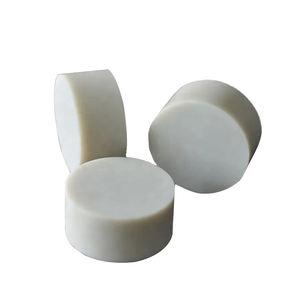
(Ultra-thin AlN Ceramic Substrate / 0.1mm Thickness Aluminum Nitride Ceramic)
Applications of Ultra-thin AlN Ceramic Substrate / 0.1mm Thickness Aluminum Nitride Ceramic
Ultra-thin aluminum nitride (AlN) ceramic substrates with 0.1 mm density offer progressed services for modern technology. These substratums excel in thermal monitoring. Their high thermal conductivity enables rapid warm transfer. Digital devices generate significant heat during procedure. Reliable warmth dissipation is essential for performance. AlN substrates prevent overheating in compact systems. This prolongs component life-span.
The 0.1 mm thickness fits space-sensitive applications. Miniaturized electronics require slim products. AlN substrates fit into smart devices, wearables, and IoT tools. Their thin account sustains flexible circuit styles. High-power LED illumination benefits from these substratums. Bright LEDs produce intense warmth. AlN porcelains take care of thermal lots successfully. This guarantees stable light result and sturdiness.
Automotive electronics rely upon AlN for integrity. Electric lorries use high-power components. Heat accumulation impacts performance. Ultra-thin AlN substrates preserve ideal temperatures. They improve security in battery systems. Sensors and control devices additionally use these substratums. Extreme settings call for durable products. AlN stands up to corrosion and thermal shock.
Clinical devices prioritize accuracy and dependability. Implantable electronic devices require biocompatible products. AlN ceramics meet clinical criteria. Mobile diagnostic equipment utilizes thin substratums. This lowers device weight and size. Thermal stability makes certain exact analyses.
RF and microwave applications use AlN for signal honesty. High-frequency circuits require low-loss materials. The dielectric properties of AlN reduce signal distortion. 5G innovation needs efficient warmth monitoring. Ultra-thin substrates support compact antenna designs. Aerospace systems gain from light-weight thermal services. AlN withstands severe temperatures and vibrations.
Industrial lasers utilize AlN for warmth dissipation. High-energy lasers generate intense warmth. Substratums preserve light beam quality and security. Power electronic devices in renewable energy systems rely on AlN. Solar inverters and wind turbines call for effective air conditioning. The material makes certain consistent power conversion.
Ultra-thin AlN substrates allow innovation throughout markets. Their mix of thermal efficiency, electric insulation, and mechanical toughness addresses contemporary engineering challenges.
Company Introduction
Advanced Ceramics founded on October 17, 2014, is a high-tech enterprise committed to the research and development, production, processing, sales and technical services of ceramic relative materials and products.. Since its establishment in 2014, the company has been committed to providing customers with the best products and services, and has become a leader in the industry through continuous technological innovation and strict quality management.
Our products includes but not limited to Silicon carbide ceramic products, Boron Carbide Ceramic Products, Boron Nitride Ceramic Products, Silicon Carbide Ceramic Products, Silicon Nitride Ceramic Products, Zirconium Dioxide Ceramic Products, Quartz Products, etc. Please feel free to contact us.(nanotrun@yahoo.com)

Payment Methods
T/T, Western Union, Paypal, Credit Card etc.
Shipment Methods
By air, by sea, by express, as customers request.

5 FAQs of Ultra-thin AlN Ceramic Substrate / 0.1mm Thickness Aluminum Nitride Ceramic
What is the ultra-thin AlN ceramic substrate used for? The ultra-thin AlN ceramic substrate is designed for advanced electronics requiring efficient heat management and electrical insulation. It works in high-power LED lighting, semiconductor modules, and RF/microwave devices. The 0.1mm thickness allows integration into compact designs without sacrificing performance. It handles extreme temperatures and resists chemical corrosion.
Why choose 0.1mm thickness for AlN ceramic substrates? The 0.1mm thickness suits modern electronics needing miniaturization. Thinner substrates reduce space in devices like smartphones and wearables. They maintain high thermal conductivity for heat dissipation. This thickness balances mechanical strength and flexibility. It meets demands for lightweight, high-performance materials in tight spaces.
How does the thermal conductivity of AlN compare to other materials? Aluminum nitride has thermal conductivity of 170-200 W/mK. This is much higher than alumina (around 25 W/mK). High thermal conductivity moves heat away from components faster. It prevents overheating in high-power applications. AlN ensures stable operation in environments with rapid temperature changes.
Can ultra-thin AlN substrates replace traditional materials like alumina? Yes. AlN outperforms alumina in thermal management for high-power electronics. Alumina works for basic insulation but struggles with heat in advanced systems. AlN handles higher thermal loads and offers better electrical insulation. It is ideal for applications needing reliability under stress.
What precautions are needed when handling 0.1mm AlN substrates? Handle the substrate carefully to avoid cracks. Use tweezers or vacuum tools during installation. Avoid bending or applying uneven pressure. Clean surfaces before bonding to ensure proper adhesion. Store in dry conditions to prevent moisture absorption. Follow manufacturer guidelines for machining or cutting.
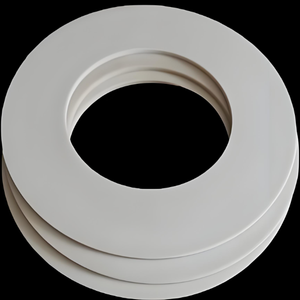
(Ultra-thin AlN Ceramic Substrate / 0.1mm Thickness Aluminum Nitride Ceramic)
REQUEST A QUOTE
RELATED PRODUCTS
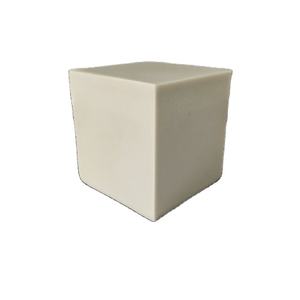
High Quality 99.9% 90-120um Aluminum Nitride Powder AlN Powder for Ceramics and Semiconductor CAS 24304-00-5
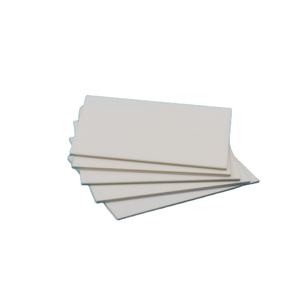
AlN Aluminum Nitride Ceramic Plate

High Purity 97-98% Aluminum Nitride AlN Spherical Powder 3-5um Ceramic Microspheres Durable Heat Conductive Material

High Heat Conductivity AlN Aluminum Nitride Ceramic Sheet
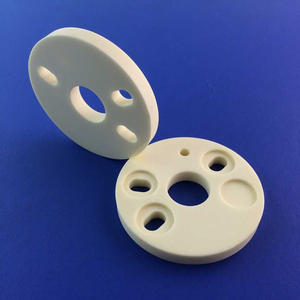
Hot ing Alumina Nitride Sheet Substrate Wafer Aluminum Nitride Ceramic Substrate Aln Wafer
